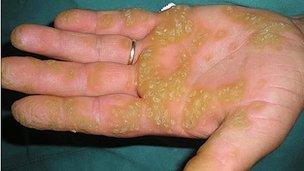Dundee University uncover gene behind skin disease
- Published

Punctate PPK causes dots of hard, thickened skin which cause pain and discomfort
A team led by the University of Dundee believes it has made a significant step in understanding a skin disease which affects thousands in the UK.
Researchers have identified how the "p34 gene" plays a key role in causing the disease punctate PPK.
The condition causes dots of hard, thickened skin which are painful and uncomfortable.
It is believed the discovery will allow for easier diagnosis of punctate PPK and help developing new therapies.
The research team, led by Prof Irwin McLean at the University of Dundee, has published its results in the journal Nature Genetics.
Malfunctioning gene
Prof McLean said: "We have not only found this gene but we have been able to figure out how it works, which is very important.
"When the gene is disrupted or knocked out, the cells in the skin grow too fast and this results in these hard, thick, painful lesions which can be quite debilitating.
"When the gene is working properly then the skin forms normally."
He said he believed the research would lead to better treatments.
Prof McLean added: "The pathway where this gene functions is a possible drug target, although it will need more work to identify how we can take advantage of that."
Punctate PPK is one of a whole family of PPK skin diseases, each of which is relatively rare.
It is estimated about one in every 15,000 people in the UK is affected by the disease.
New technology
The gene discovery was made possible by use of "next generation" sequencing technology, which allows researchers to screen large amounts of genome data in a short space of time.
Prof McLean said: "This is a notable step forward in diagnosing skin diseases and the genetic causes behind them as this is research that we simply could not have done just a few years ago. We are now able to spot faulty genes and track their behaviour far more effectively.
"The technology is making a huge difference and it will, in time, help to deliver significant results with benefits for patients with diseases like this one."
- Published9 October 2012
- Published2 October 2012
- Published24 September 2012
- Published19 September 2012